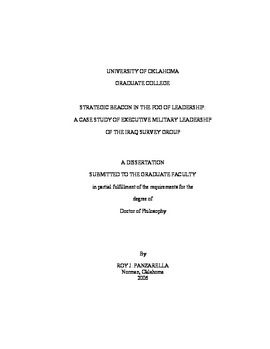| dc.contributor.advisor | Copeland, Gary, | en_US |
| dc.contributor.author | Panzarella, Roy J. | en_US |
| dc.date.accessioned | 2013-08-16T12:20:03Z | |
| dc.date.available | 2013-08-16T12:20:03Z | |
| dc.date.issued | 2006 | en_US |
| dc.identifier.uri | https://hdl.handle.net/11244/991 | |
| dc.description.abstract | Even though the field of strategic leadership has transformed over the past quarter of a century, there is a significant shortage of serious studies. Using a qualitative investigation into strategic military leadership of the Iraq Survey Group whose mission was to determine the truth concerning the existence of Iraqi Weapons of Mass Destruction (WMD), I argue that some specific leadership behaviors directly link successful strategic military leadership to classic leadership theories, especially the trait leadership theory. Framing the inquiry were three of the most prominent theoretical traits: intelligence, integrity and personality. Specifically, I argue that General Keith Dayton was a successful intelligent strategic military leader partially because of his extraordinary absorptive capacity and remarkable ability to retain and employ information. Additionally, I contend that Dayton was an effective strategic leader of integrity whose core values or behavior did not change despite the enormous pressure to find WMD and the weight of being responsible for the lives over a thousand women and men in a combat environment. Finally, I make a case that General Dayton was a successful strategic leader because of his unique personality. Evidence solidly supports theoretical linkages to three of the five personality traits: conscientiousness, openness to experience and emotional balance. Despite the discovery that General Dayton's behavior did not support the classic theory for extraversion and agreeableness, he was nonetheless effective and efficient and therefore a successful strategic military leader. | en_US |
| dc.format.extent | vi, 187 leaves : | en_US |
| dc.subject | Political Science, Public Administration. | en_US |
| dc.subject | Psychology, Industrial. | en_US |
| dc.subject | Biography. | en_US |
| dc.subject | Dayton, Keith W. Military leadership. | en_US |
| dc.title | Strategic beacon in the fog of leadership: A case study of executive military leadership of the Iraq Survey Group. | en_US |
| dc.type | Thesis | en_US |
| dc.thesis.degree | Ph.D. | en_US |
| dc.thesis.degreeDiscipline | Department of Political Science | en_US |
| dc.note | Source: Dissertation Abstracts International, Volume: 67-02, Section: B, page: 1192. | en_US |
| dc.note | Adviser: Gary Copeland. | en_US |
| ou.identifier | (UMI)AAI3207186 | en_US |
| ou.group | College of Arts and Sciences::Department of Political Science | |
